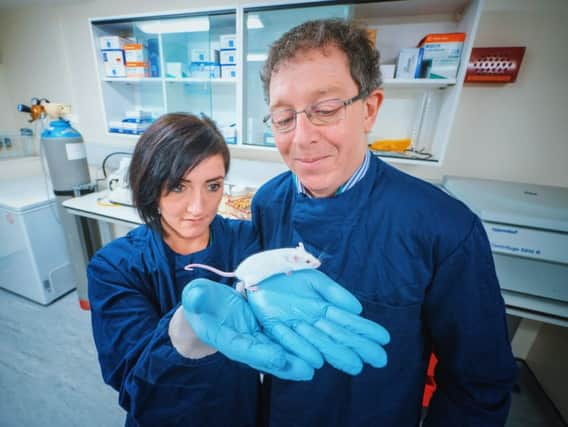Former town pupil in Alzheimer's discovery


It’s a potential breakthrough made by researchers at the University of Leicester, including lead researcher Dr Sophie Bradley, a former pupil of Robert Smyth Academy in Market Harborough.
The four-year study involved a new type of drug which reversed memory loss in mice, and extended their lives.
Advertisement
Advertisement
Alzheimer’s is considered to be one of the world’s major health challenges. Alzheimer’s Research UK estimates that there are 850,000 people living with dementia in the UK today. There are currently no treatments that slow or stop Alzheimer’s disease.
But Dr Bradley (pictured with mouse on the right) told the Mail: “What we’ve found with our research at the University of Leicester is a new class of drug that can restore memory loss and extend lifespan - in mice.
“This is a very early study, but important for the class of drug we’ve been using, which targets a protein in the brain which has been linked to memory loss.”
She stressed that the University team, led by Professor Andew Tobin, had not yet found a “cure” that can be given to humans.
Advertisement
Advertisement
She explained: “What our report does is to direct pharmaceutical companies towards a brand new area of research.”
The potential breakthrough is the result of a study by Medical Research Council (MRC) scientists based at the MRC Toxicology Unit at the University of Leicester. It has just been published in the Journal of Clinical Investigation.
The study was led by Professor Tobin alongside colleagues from pharmaceutical companies. Dr Bradley was the lead researcher.
Professor Tobin said: “The paper describes drug-like molecules that can restore memory loss and slow progression of neuro-degenerative disease in a manner that relates to the potential of these drugs in human Alzheimer’s disease.
Advertisement
Advertisement
“We have been using mice whose brain cells are progressively dying, similar to what happens in humans with Alzheimer’s disease.”
Dr Bradley (30) grew up in Lubenham. She went to Lubenham All Saints Primary School, Welland Park Academy and Robert Smyth Academy.
She moved into the MRC Toxicology Unit in 2011, which is where the research was conducted.
Dr Bradley said: “What we’ve found can now be used as a starting point for pharmaceutical companies who want to develop our findings.
“If that happens we could be five to 10 years away from clinical trials on humans.”